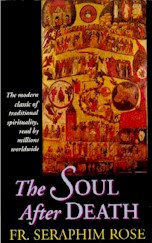
Death & the Future Life: Suggested Books on Death & the Future Life
The Future Life According to Orthodox Teaching, by Constantine Cavarnos (Etna: The Center for Traditionalist Orthodox Studies, 1985). The full text of this excellent work will soon be available exclusively on the Orthodox Christian Information Center.
The Mystery of Death, by Nikolaos Vassiliadis, trans. Fr. Peter A. Chamberas (Athens: The Orthodox Brotherhood of Theologians, 1997).
Life After Death, by Metropolitan Hierotheos of Nafpaktos.
A Christian Ending: A Handbook for Burial in the Ancient Christian Tradition, by J. Mark and Elizabeth J. Barna. "While aimed at Orthodox Christians, this book would be a very helpful guide to anyone who is interested in preparing for a funeral within the context of community, without the use of corporate funeral homes, and using green and sustainable methods."
Instructions for the Immortal, Or What to Do if You Still Die, by the Priest-Martyr Daniel Sysoev.
Be Ready: An Approach to the Mystery of Death, by Hieromonk Gregorios. This lengthy excerpt is provided by the translator, Fr. Michael Monos, the proistamenos of St. Luke Greek Orthodox Church in Columbia, MO and founder of Newrome Press.
The Soul After Death, by Father Seraphim Rose. Read most of Appendix III in reply to his critics. "In this work, published in 1980, the traditional Orthodox teaching on the subject is set forth and, with that teaching as a base, contemporary 'after-death' and 'out-of-the-body' experiences are interpreted" (Dr. Constantine Cavarnos in The Future Life According to Orthodox Teaching, p. 14). Read the Preface.
Eternal Mysteries Beyond the Grave, Archimandrite Panteleimon (Jordanville, NY: Holy Trinity Monastery). Orthodox teachings and traditions concerning the immortality of the soul and life beyond the grave, drawn from a wide range of patristic and pious sources. This book was given a hearty commendation by Father Seraphim Rose in his "Prologue" to Vita Patrum: "The Dialogues of St. Gregory the Great, as well as Eternal Mysteries Beyond the Grave, is excellent medicine for today's over-sophisticated Orthodox Christians. They can be a touchstone for us: if, reading them, we find them 'naive,' 'too realistic,' or otherwise distasteful, we can know that we are still too 'sophisticated,' not childlike and simple enough in our Orthodoxy. If we are converts, we can know that we have not yet entered enough into the genuine spirit of Orthodoxy; if we are 'native Orthodox,' we can know that our Orthodoxy has been corrupted by false modern Roman Catholic ideas" (p. 24).
The Evergetinos: A Complete Text, Vol. II of the First Book (Etna: The Center for Traditionalist Orthodox Studies, 1991)
Dialogues, by St. Gregory the Great (the Dialogist). From the Fathers of the Church series (New York, 1959). See Vol. IV, which is entirely devoted to the subject of death and the future life.
The anti-Orthodox teaching on life after death of this critic is all the more dangerous in that it appeals to a very subtle passion of contemporary mankind. The Orthodox teaching on life after death is rather severe and demands a very sober response on our part, full of the fear of God. But mankind today is very pampered and self-centered and would rather not hear of such stern realities as judgment and accountability for sins. One can be much more "comfortable" with an exalted teaching of "hesychasm" that tells us that God is not "really" as stern as the Orthodox ascetic tradition has described Him, that we "really" need have no fear of death and the judgment it brings, that if only we occupy ourselves with exalted spiritual ideas like those in the Philokalia (dismissing as "allegories" all the passages on the toll-houses) we will be "safe" under a "loving God" who will not demand an accounting of all our sins, even those forgotten or unrecognized.... The end of these exalted reflections is a state not far different from that of those "charismatics" and others who feel themselves already assured of salvation, or of those who follow the occult teaching that states there is nothing to fear in death.
The true Orthodox teaching on life after death, on the other hand, fills one precisely with the fear of God and the inspiration to struggle for the Kingdom of Heaven against all the unseen enemies who oppose our path. All Orthodox Christians are called to this struggle, and it is a cruel injustice to them to dilute the Orthodox teaching to make them more "comfortable." Let each one read the Orthodox texts most suited to the spiritual level at which he presently finds himself; but let no one tell him that he can dismiss as "fables" the texts he may find "uncomfortable." Fashions and opinions among men may change, but the Orthodox tradition remains ever the same, no matter how few may follow it. May we ever be its faithful children!
—Fr. Seraphim of Platina, The Soul After Death, Appendix III,
"Answer to a Critic "
This is one of the most important articles on this page. The reading of it
is highly encouraged.

